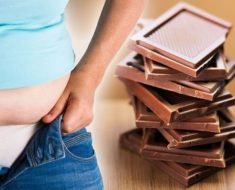Period pains: NHS give advice on helping cramps
We use your sign-up to provide content in ways you’ve consented to and to improve our understanding of you. This may include adverts from us and 3rd parties based on our understanding. You can unsubscribe at any time. More info
In most cases period pain is mild enough to treat at home, according to the NHS. You might take painkillers such as ibuprofen or aspirin to help manage your pain. While exercising and moving about may be the last thing some people want to be doing whilst on their periods, there may actually be some exercises which are able to help ward off pain.
Your hormones play a key role in controlling your energy levels. Oestrogen in your body is at a low point during your period, which is what causes you to feel tired and lose energy.
But according to personal fitness experts at Origym, there are physical and mental benefits of exercise that can actually combat your symptoms.
“If you do suffer from severe cramping, light exercise such as walking is recommended as released endorphins act as pain blockers and improved blood flow opens up blood vessels in the uterus to relieve cramps,” the experts at Origym say.
Nonetheless, the experts note that the severity of your period can change, “so don’t push yourself too hard”.

There are certain forms of exercise that may be more beneficial than others.
For example, you may want to consider strength training if cardio feels too much at the start of your period. The experts say to keep the volume and reps low.
You might also want to consider yoga and pilates.
“The days ahead of your period are a great time to try low-intensity exercises like yoga or pilates. During this point you may be experiencing low energy and muscular fatigue so trying yoga can help you relax and reduce symptoms,” they explain.
For some people light cardio may be a form of exercise they want to do on their period.
Light aerobic activities such as swimming or walking are both “good choices” say experts, as they will give you an endorphin boost.
“Whilst exercising, your body releases endorphins, a feel-good chemical that interacts with your brain to give you a natural high,” the experts say.
So if you experience fatigue throughout your period, light forms of cardio may boost your energy and your mood.

Period pain usually starts when your bleeding begins, although some women have pain several days before the start of their period.
“The pain usually lasts 48 to 72 hours, although it can last longer. It’s usually at its worst when your bleeding is heaviest,” says the NHS.
The health service adds that you should see a GP if you have severe period pain or your normal pattern of periods changes.
For example, if your periods become heavier than usual or irregular.

“It’s not known why some women have more period pain than others,” says the NHS.
Nonetheless, it is common for young girls to experience period pain when they begin getting periods.
Period pain tends to happen when the muscular wall of the womb tightens.
During your period, the wall of the womb starts to contract more to help the womb lining shed as part of your period.
Source: Read Full Article





